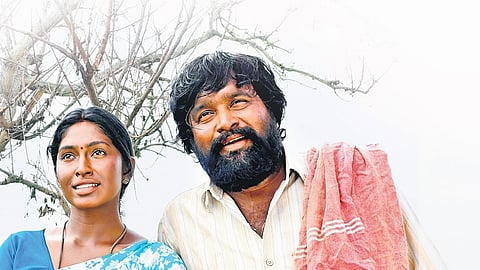

Nandhan begins with a note from the director, stressing how caste discrimination is still meted out to the deplorable lengths shown in the film. It all but says, “You best believe it!” So, whenever we feel the film is intentionally milking our sympathies, we are reminded of the disclaimer and it transforms our disbelief into shock. Through this, the film largely succeeds in drawing out the intended emotion from its audience.
However, even as we are ready and willing to believe the film when it shows how the events unfolding on-screen are still a reality now, director Era Saravanan draws out garish unsubtle performances from his actors, which ironically acts counter-intuitive to the message of the film.
The antagonists all but twirl their moustaches and laugh maniacally like cartoon villains. With that being said, Balaji Sakthivel has understood his assignment well and has given an intentionally amped-up and thoroughly entertaining performance. On the other hand, Sasikumar, albeit with a lack of finesse, comfortably plays a simpleton ignorant of the injustice meted out to him.
At the beginning of the film, two sections of upper-caste men argue about who should become the president of the village. Nandhan, an educated man from an oppressed caste, points out the unfair nature of their selection process and demands his name to be included in the race. He is promptly killed minutes later. After our walking-talking inciting incident has served its purpose, almost every single character from the oppressed caste shown in the film is depicted through a heavily patronising lens.
The characters are designed as if they are oppressed because they are naive or lack the mental acuity to understand their oppression. The lack of nuance in realistically portraying the inner workings of caste oppression is apparent. The pinnacle of this ignorance is Sasikumar’s Koozh Paanai AKA Ambeth Kumar.
Written as a fiercely loyal worker to his casteist employer, his character seems like a caricature of stereotypes that might exist in a casteist mind. The central criticism is not that such incidents do not happen or that such characters do not exist in real life. However, while dealing with such a sensitive issue, the director could have exercised restraint and subtlety. One could argue that Suruthi Periasamy, who plays Sasikumar’s wife in the film, stands as a voice of reason and common sense, promptly identifying injustice whenever she can. However, it merely comes off as a character explicitly designed to collect feminist brownie points.
Several cinematic devices are used with the express intent to wring out our emotions. From slow-motion shots of an old woman being buried, while intense rain hurriedly fills her grave with mud to long drawn out sequences of Ambeth Kumar’s family being publicly thrashed, no punches are pulled in order to overwhelm us.
The most effective part of Nandhan arrives towards the end where we are shown montages of real people from oppressed castes who faced harassment when they tried to stand for elections. While their tears are portrayed through a magnifying glass, Nandhan fails to capture their angst, rage, and the systemic ways in which they had their hands tied, all of which are palpable in their speeches.
While it might have had its heart in the right place, the film ultimately falters in truthfully capturing the plight of the oppressed with sensitivity. Nandhan had its focus trained on making us weep for such injustice. However, as the credits roll, it is hard to shake off the question: Does the film want us to empathise with the oppressed or pity them?